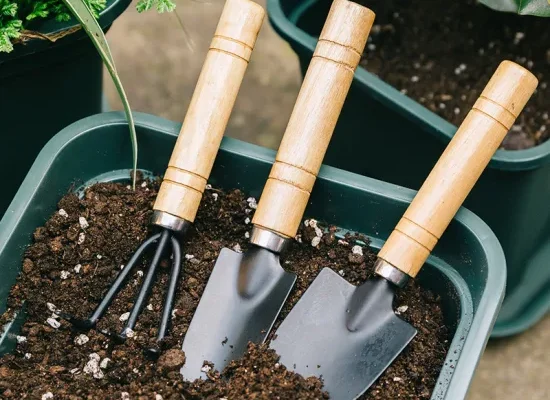Starting a garden can be incredibly rewarding and relaxing, especially with the right tools in hand. If you’re new to gardening, choosing the right gardening tools can make all the difference, allowing you to work more efficiently and care for your plants with ease. Let’s look at some essential tools every beginner gardener should consider.
1. Garden Gloves
Gardening involves handling soil, plants, and sometimes sharp objects, so gloves are essential to protect your hands. Look for gloves that are durable, water-resistant, and fit well. Some gloves come with added grip, making them great for handling slippery tools. A good pair of gloves will also protect you from thorns and reduce the chances of blisters.
2. Hand Trowel
A hand trowel is a small, versatile tool used for digging, planting, and transferring plants. It’s an absolute staple in any beginner’s toolkit and perfect for working in small spaces like flowerpots or raised garden beds. Look for a sturdy trowel with a comfortable handle to make repetitive tasks easier.
3. Pruning Shears (Secateurs)
Pruning shears are invaluable for trimming plants, cutting flowers, and shaping shrubs. These tools help keep plants healthy by removing dead or damaged parts, promoting new growth. Bypass pruners are ideal for live plants, while anvil pruners are better for dead or dry branches. Sharp, well-made pruning shears are a must for maintaining your garden.
4. Garden Hoe
A garden hoe is a versatile tool used to break up soil, remove weeds, and prepare planting beds. For beginners, a standard hoe with a flat blade works well for most gardening tasks. Choose a hoe that feels balanced and has a comfortable grip, making it easy to use for extended periods.
5. Watering Can or Hose
Keeping your plants hydrated is one of the most crucial parts of gardening. A watering can is perfect for potted plants or small garden spaces, while a hose with an adjustable nozzle works better for larger areas. Be sure to water your plants in the early morning or late evening to minimize water evaporation.
6. Rake
A rake helps you clear away leaves, grass clippings, and other debris that accumulates in the garden. A simple leaf rake is great for lightweight tasks, while a sturdier garden rake can be used to break up soil and level the ground. Raking keeps your garden clean and ensures that your soil remains healthy.
7. Garden Fork
A garden fork is essential for turning soil, mixing compost, and breaking up clumps. This tool is especially useful if you’re working with tough or compacted soil. Choose a fork with sharp, sturdy tines that can handle a variety of gardening tasks without bending.
8. Wheelbarrow
A wheelbarrow is a lifesaver for moving heavy loads of soil, mulch, compost, or plants. Look for a wheelbarrow that’s stable and easy to maneuver, especially if your garden has uneven ground. A good wheelbarrow reduces the physical strain of transporting materials, making your gardening experience much more enjoyable.
9. Garden Kneeler or Kneeling Pad
Spending time close to the ground can be hard on your knees, and a kneeling pad or garden kneeler can provide extra comfort. This tool is particularly useful for tasks like planting, weeding, or trimming, where you need to stay low to the ground. Many kneelers also double as seats, giving you an alternative for taking breaks.
10. Soil Testing Kit
For beginners, understanding the quality of your soil is essential for successful gardening. A soil testing kit can measure the pH and nutrient levels of your soil, helping you determine what plants will thrive best in your garden. With this information, you can add any necessary amendments to improve your soil’s health.
Tips for Choosing Quality Gardening Tools
When shopping for gardening tools, consider the following:
- Quality Over Quantity: Invest in a few high-quality tools that will last longer rather than a large set of lower-quality ones.
- Comfortable Grip: Gardening can be physically demanding, so look for tools with ergonomic, cushioned handles to reduce strain on your hands.
- Durability: Metal parts should ideally be made of stainless steel or another rust-resistant material. Tools with wooden handles are durable but require care to prevent splintering.
- Easy to Clean: Gardening tools should be easy to clean and maintain. Keeping them clean and dry extends their lifespan and keeps them functioning well.
Final Thoughts
With the right gardening tools, beginners can enjoy a rewarding experience in their gardens. Remember, you don’t need every tool out there – start with the basics and expand as your garden grows. Each tool you add will help you keep your garden looking beautiful, and before you know it, you’ll feel like a seasoned gardener.
